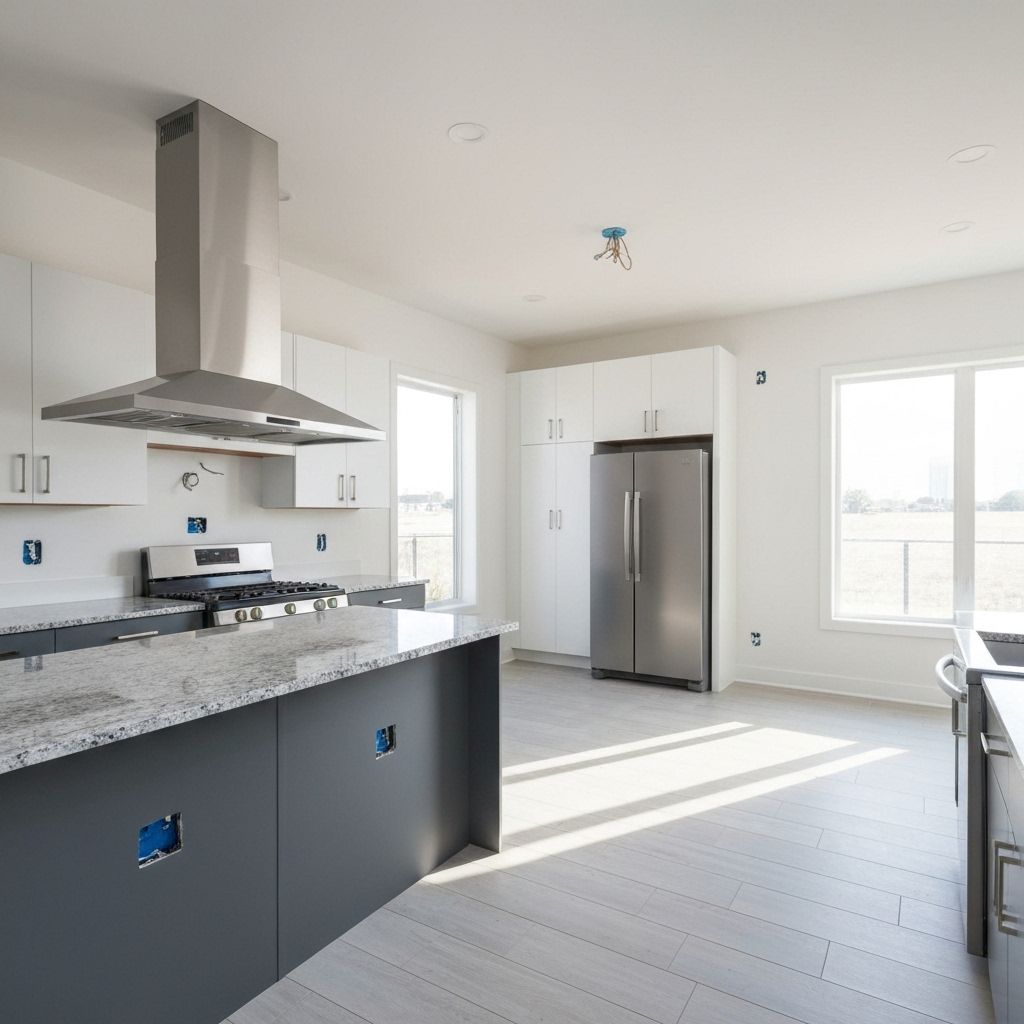You've picked out the perfect countertops, chosen your dream appliances, and finalized your cabinet design. But have you thought about what's behind the walls? Your kitchen's electrical system is the backbone of your remodel, and overlooking it can lead to costly problems down the road.
Modern kitchens demand significantly more power than kitchens built even 10-15 years ago. With high-efficiency appliances, smart home technology, and increased outlet requirements, your existing electrical system may not be up to the task.
Why Electrical Upgrades Matter in Kitchen Remodels
The Modern Kitchen Power Demand
Today's kitchens are power-hungry spaces. Consider these common appliances and their electrical requirements:
- ⚡Electric Range/Oven: Requires a dedicated 240V, 40-50 amp circuit
- ⚡Refrigerator: Needs its own dedicated 120V, 20 amp circuit
- ⚡Dishwasher: Requires a dedicated 120V, 15-20 amp circuit
- ⚡Microwave: Should have its own dedicated 120V, 20 amp circuit
- ⚡Garbage Disposal: Needs a dedicated 120V, 15-20 amp circuit
- ⚡Countertop Outlets: Minimum of two 20 amp circuits for small appliances
National Electrical Code Requirements
The National Electrical Code (NEC) has specific requirements for kitchen electrical systems that must be met during any remodel:
GFCI Protection
All countertop outlets within 6 feet of a sink must have Ground Fault Circuit Interrupter (GFCI) protection to prevent electrical shock.
Outlet Spacing
Outlets must be placed no more than 4 feet apart along countertops, and no point along the counter should be more than 2 feet from an outlet.
Dedicated Circuits
Major appliances must have their own dedicated circuits. You cannot share circuits between high-draw appliances.
Arc Fault Protection
Many jurisdictions now require AFCI (Arc Fault Circuit Interrupter) protection for kitchen circuits to prevent electrical fires.
Coordinating Electrical Work with Your Remodel
A successful kitchen remodel requires careful coordination between your general contractor, electrician, and other trades. When working with professional kitchen remodeling contractors, make sure electrical planning is part of the initial design phase, not an afterthought.
Timeline Coordination
- 1.Design Phase: Electrician reviews plans and identifies electrical needs
- 2.Demolition: Assess existing electrical system and panel capacity
- 3.Rough-In: Install new circuits, outlets, and wiring before walls close
- 4.Inspection: Electrical work must pass inspection before proceeding
- 5.Finish Work: Install outlets, switches, and light fixtures
If you're in the Los Angeles area, experienced kitchen renovation specialists like LA Top Renovation understand the importance of coordinating electrical work with the overall remodel timeline. They work closely with licensed electricians to ensure all electrical upgrades are properly planned and executed.
When You Need an Electrical Panel Upgrade
Many older homes have 100-amp electrical panels that simply can't handle the demands of a modern kitchen. Signs you may need a panel upgrade include:
Frequent Breaker Trips
If your breakers trip regularly, your panel is overloaded and needs upgrading.
No Available Slots
If your panel has no empty breaker slots for new circuits, you'll need an upgrade.
Insufficient Amperage
100-amp panels often can't support modern kitchen loads. 200-amp is now standard.
💡Pro Tip
Panel upgrades typically cost $1,500-$3,000 but are essential for safety and functionality. Budget for this early in your remodel planning to avoid surprises.
Budgeting for Electrical Upgrades
Electrical work is a significant part of any kitchen remodel budget. Here's what to expect:
When working with kitchen remodeling experts, they can help you understand the full scope of electrical work needed and coordinate with qualified electricians to ensure accurate budgeting from the start.
Smart Kitchen Technology
Modern kitchens increasingly incorporate smart technology, which requires careful electrical planning:
- 📱Smart Lighting: Requires neutral wires at switch locations for smart switches
- 📱Smart Appliances: Need reliable Wi-Fi coverage and proper electrical connections
- 📱Voice Control: Plan outlet locations for smart speakers and hubs
- 📱USB Outlets: Consider outlets with built-in USB charging ports
Permits and Inspections
All electrical work in a kitchen remodel requires permits and inspections. Here's what you need to know:
The Permit Process
Who Pulls the Permit: Your licensed electrician should handle all electrical permits. This ensures the work is done to code and properly inspected.
Inspection Requirements: Electrical work must be inspected before walls are closed up. Schedule inspections early to avoid delays.
Code Compliance: All work must meet current NEC standards, even if your existing system was grandfathered in under old codes.
Documentation: Keep all permits and inspection records. They're important for insurance and future home sales.
Don't Overlook the Electrical
Your kitchen remodel is a significant investment, and the electrical system is its foundation. Cutting corners on electrical work can lead to safety hazards, code violations, and expensive fixes down the road.
Whether you're working with Los Angeles kitchen remodeling services or tackling a DIY project, make sure to involve a licensed electrician early in the planning process. They can assess your current system, identify necessary upgrades, and ensure your new kitchen is safe, functional, and code-compliant.
Key Takeaways
- ✓Modern kitchens require significantly more electrical capacity than older homes provide
- ✓Each major appliance needs its own dedicated circuit
- ✓GFCI protection is required for all countertop outlets near water sources
- ✓Panel upgrades are often necessary and should be budgeted for early
- ✓All electrical work requires permits and inspections
- ✓Coordinate electrical work with your general contractor from day one
Planning a Kitchen Remodel?
ABR Electric specializes in kitchen electrical upgrades. We'll assess your current system, recommend necessary improvements, and ensure your new kitchen has the power it needs.
Licensed & Insured | TECL #27762 | Serving McKinney, Allen, and Collin County, TX
